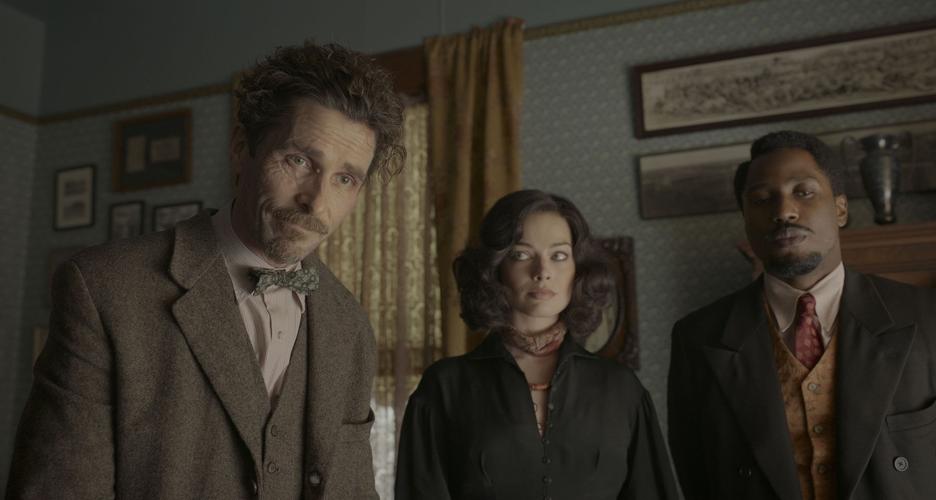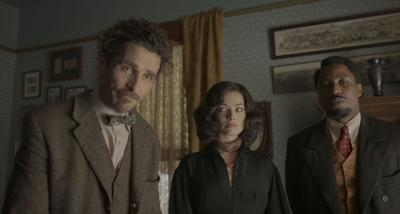As is its wont, Hollywood has seen fit to give one of its most troubling directors yet another go at it.
After decades of allegations of abuse and downright tyrannical on-set behavior, decorated director David O. Russell is back with Amsterdam. Set primarily in 1933, the impossibly star-studded screwball mystery is inspired lightly by the true story of a planned fascist coup to remove FDR from the White House. The cast is led by Christian Bale, John David Washington and Margot Robbie as two soldiers and a nurse who meet during World War I and form an impassioned friendship. As the film jumps back and forth from their time in postwar Amsterdam to their experiences stateside 15 years later, we see a cavalcade of stars and ceaseless cameos: Chris Rock! Robert De Niro! Zoe Saldaña! Michael Shannon and Mike Myers as a pair of bird-watching spies! Rami Malek and Anya Taylor-Joy as two blue-blooded freaks! Even Taylor Swift for a moment!
With jaw-dropping production design, a decent murder-mystery setup and a barrage of great one-liners in its first act, Amsterdam for a moment feels like proof that these A-listers know something we don’t — that perhaps Russell’s alleged screaming and groping and manhandling is simply the price you pay for genius. But for a movie with a half a dozen or so of the biggest movie stars on the planet, Amsterdam often doesn’t seem to know what to do with them.
Previous Russell collaborator Bale — brutally committed here, as always — is Burt Berendsen, an ailment-afflicted doctor who makes prosthetics and pills and potions for his fellow war-maimed veterans. Washington’s Harold Woodsman is his lawyer best friend, and Robbie’s Valerie Voze is the mysterious socialite-turned-battlefield-nurse-turned-outsider-artist who rounds out their triad. When Berendsen and Woodsman’s former commanding officer ends up dead under mysterious off-screen circumstances, the pals are brought in to sort all this out.

Amsterdam
From there, things get overstuffed, overwrought and convoluted. The stakes from the outset are life-and-death, sure, but suddenly and without warning Amsterdam becomes a film about global domination with very unclear parameters. As De Niro’s Gen. Gil Dillenbeck puts it broadly, “Somebody’s trying to do something dark and treacherous.” And until a bottleneck of action late in the film’s third act, we don’t really get much information as to who’s doing what and for what purpose. Until that, it’s charming flirtation and laugh lines, intermittent gruesome violence, Bale doing a Herculean amount of heavy lifting, a subplot involving endangered birds and everyone looking great in their period-correct costumes. There’s also a very brief moment in which the always lovely Andrea Riseborough, as Berendsen’s wife, seems to display a Cronenbergian psychosexual obsession with her husband’s scars. This is never revisited.
Russell has done some great world-building here — as has his crew, in a more literal sense — but he overindulges in that world. Perhaps there’s no one in the allegedly megalomaniacal auteur’s sphere who’s willing to tell him no. This is a director who, after all, is reported to have kicked an extra, brought both Amy Adams and Sally Field to tears, and headbutted George Clooney. Who the hell wants to tell that kind of guy he’s got third-act problems? Ultimately, Amsterdam’s conclusion has to explain itself with flashbacks, voiceover and dialogue in which a couple of characters literally explain what’s happening — not to mention a truly random pair of fantasy sequences.
If you’ve got an appetite for big-budget, auteur-directed period pieces set a century ago and featuring scads of movie stars, hold off for Damien Chazelle’s Babylon at Christmas or Martin Scorsese’s Killers of the Flower Moon next year.







